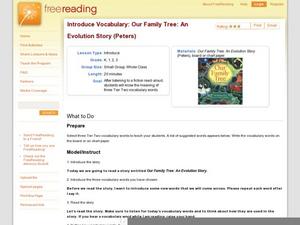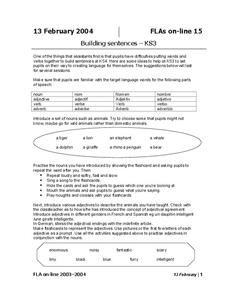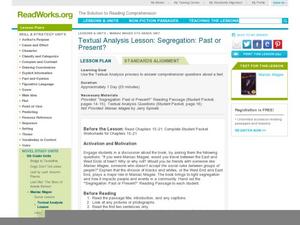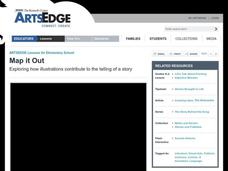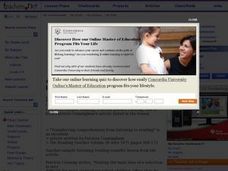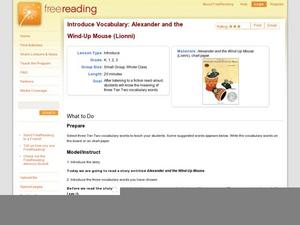Scholastic
Study Jams! Single-Digit Division
Learning the algorithm for long division is no easy task, but this resource helps to break the process into manageable steps. Beginning with an explanation of basic division vocabulary, this presentation goes on to model long division...
Scholastic
Study Jams! Tools of Measurement
From temperature and mass, to length and volume, there are many different types of measurement. Expose young learners to a variety of measurement tools using this slide show of real-life pictures. Go through the presentation one image at...
Scholastic
Study Jams! Choosing the Correct Graph
With so many types of graphs, don't let your learners get stuck figuring out which one to use. To track how Zoe spent her allowance, use this interactive lesson to review all the types of graphs and pick the best one to display the data....
Scholastic
Study Jams! Measure Length
Mia's pet lizard has grown a lot since he was a baby and she needs help measuring his length now that he's an adult. After choosing the best tool for the job, RJ goes step by step through the measurement process, modeling how to use both...
Curated OER
Descriptive Writing Using the Book Rumpelstiltskin
Use the fairy tale Rumpelstiltskin to teach your third grade class about descriptive writing. Following a teacher read-aloud of the story, the class brainstorms a list of adjectives describing the main character. Students use this list...
BBC
Rivers
The water cycle, rainfall, and the flow of water into rivers then out into the ocean are the main ideas covered here. After a teacher-led discussion and activity, learners pair off and write a commentary about the water cycle that is to...
Region of Peel
Put Me in Order
Sorting fractions, integers, decimals and square roots into sequential order is an active process when you use a gym as your setting. After your class is divided into two groups and provided with number cards, they compete to see who can...
Curated OER
Introduce Vocabulary: Our Family Tree: An Evolution Story (Peters)
Lisa Peters presents macroevolution as a large-scale family tree in her book Our Family Tree: An Evolution Story. She suggests the process from single-celled organisms to modern-day humans, and learners explore new vocabulary through the...
Curated OER
Building Sentences
Whether working with pupils in their primary language or language learners, the exercises included in this resource will encourage your pupils to build more complex sentences. Using color-coded cards of nouns, adjectives, verbs, and...
Curated OER
What's the Weather Like? Primary Level
Elementary schoolers and language learners will shine with a series of games and activities that feature weather words. The exercises can be adapted for pairs, small groups, or whole class participation.
Curated OER
Textual Analysis Lesson: Segregation: Past or Present?
Are your scholars reading Jerry Spinelli's Maniac Magee? If so, use this textual analysis packet and lesson guide to drive deeper thinking about the characters, create personal connections, and apply historical contexts to the text....
Curated OER
Adventures in Toyland
There are many ways to tell a story; Richard Patterson's three-dimensional painting If serves as the inspiration for some creative storytelling for elementary school writers. They watch a clip from Toy Story (you'll need to bring this),...
Curated OER
Map It Out
Explore how illustrations add to a story. Young learners will look at picture books to see how the pictures tell the story. They create illustrations to go with a chosen story, and then flip the activity so they have to write a story to...
Curated OER
Only the Facts
Practice the strategy of summarizing to gain meaning and knowledge from an informational text. Young readers highlight supporting details and main ideas, and then they use this to summarize two articles: "The Great Quake" and "What is an...
Curated OER
Guided Reading: Main Idea
Readers are presented with a list of three questions and asked to actively listen to a story or article to answer them. They verbally answer the questions to learn the strategy. Next, read a story to them or have them silently read a...
Curated OER
Newcomers
Explore emotions associated with moving to a new home with young learners. First they listen to the books Painted Words/Spoken Memories by Aliki and Going Home by Eve Bunting. Then they are invited to share their experiences as well as...
Curated OER
Introduce Vocabulary: Hot Air: The (Mostly) True Story of the First Hot-Air Balloon Ride (Priceman)
What a fun way to explore new vocabulary words! Marjorie Priceman's book Hot Air: The (Mostly) True Story of the First Hot-Air Balloon Ride offers plenty of new words for scholars to learn in context: amateur, assembled, demonstration,...
Curated OER
Introduce Vocabulary: Have You Seen Bugs? (Oppenheim)
Are your scholars interested in bugs? Get future entomologists excited about vocabulary through Joanne Oppenheim's colorful book Have You Seen Bugs? They use the informational text (although this strategy is useful for any book) to learn...
Curated OER
Introduce Vocabulary: Happy Birthday, Moon (Asch)
Can you wish the moon a happy birthday? Beginning readers contemplate this as they listen to Frank Asch's book Happy Birthday, Moon, the context for a vocabulary study. There are three words outlined here: chat, echo, and perfectly, but...
Curated OER
Introduce Vocabulary: Giggle, Giggle, Quack (Cronin)
Farmer Brown has his hands full with a tricky duck in Norah Cronin's book Giggle, Giggle, Quack, the context of this vocabulary study. This text is available on YouTube if you can't find it. Before reading, introduce the high level...
Curated OER
Introduce Vocabulary: Everybody Cooks Rice (Dooley)
Use Norah Dooley's culturally inspiring book Everybody Cooks Rice to explore delicious new vocabulary in context with beginning readers. The recommended words here are: delicious, grumbling, and gulp; pre-teach them before reading the...
Curated OER
Introduce Vocabulary: Clifford's Family (Bridwell)
Do you know Clifford, the big, red dog? Clifford takes an adventure to see his family, and young readers join him to learn some new vocabulary in context! Before reading, introduce the four new words: city, county,...
Curated OER
Introduce Vocabulary: Black Bear Cub (Lind)
Kids love reading stories! There are many opportunities to learn new words in context as budding readers listen to Alan Lind's story Black Bear Cub. They focus on seven nature-related vocabulary terms: cub, den, forage, lure, scarce,...
Curated OER
Introduce vocabulary: Alexander and the Wind-Up Mouse (Lionni)
Provide access to new vocabulary words (envy and mysteriously) in context as emerging readers listen to Leo Lionni's Alexander and the Wind-Up Mouse. Explain these terms before reading the story aloud and help kids utilize context clues...






